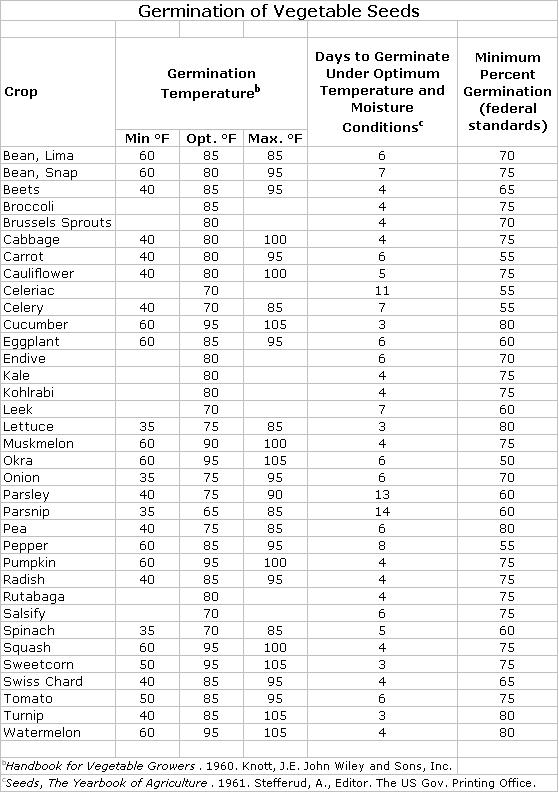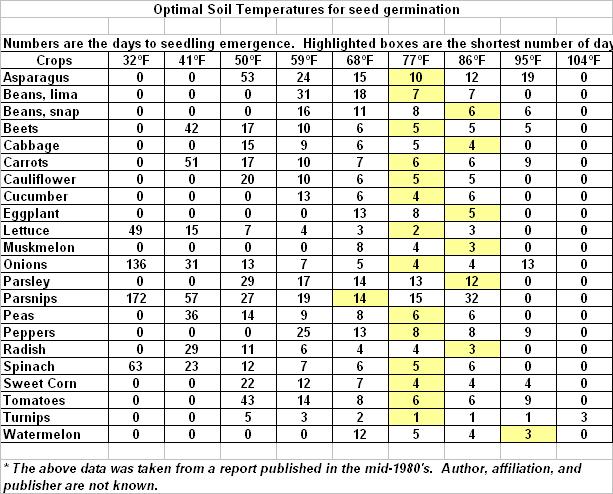majorcatfish
Garden Master
found this on the hard drive while cleaning it out , figured would share it...some good information.. really like the soil temp chart for direct seeding..


Vegetables ph levels
Asparagus 6.0-8.0
Bean, pole 6.0-7.5
Beet 6.0-7.5
Broccoli 6.0-7.0
Brussels sprout 6.0-7.5
Cabbage 6.0-7.0
Carrot 5.5-7.0
Cauliflower 5.5-7.5
Celery 5.8-7.0
Chive 6.0-7.0
Cucumber 5.5-7.0
Garlic 5.5-8.0
Kale 6.0-7.5
Lettuce 6.0-7.0
Pea, sweet 6.0-7.5
Pepper, sweet 5.5-7.0
Potato 4.8-6.5
Pumpkin 5.5-7.5
Radish 6.0-7.0
Spinach 6.0-7.5
Squash, crookneck 6.0-7.5
Squash, Hubbard 5.5-7.0
Tomato 5.5-7.5
Approximate life expectancy of vegetable seeds stored under favorable conditions.
Vegetable Years
Artichokes 5 years
Arugula 3 years
Beans 3 years
Beets 4 years
Broccoli 3 years
Brussels Sprouts 4 years
Cabbage 4 years
Carrots 3 years
Cauliflower 4 years
Celery/Celeriac 5 years
Chard 4 years
Collards 5 years
Corn 2 years
Cress 5 years
Cucumbers 5 years
Eggplant 4 years
Endive/Escarole 5 years
Fennel 4 years
Kale 4 years
Kohlrabi 4 years
Leeks 1 year
Lettuce 5 years
Melons 5 years
Mustard 4 years
Okra 2 years
Onions 1 year
Peas 3 years
Peppers 2 years
Pumpkins 4 years
Radish 5 years
Rutabagas 4 years
Spinach 2-3 years
Summer Squash 4 years
Tomatoes 4 years
Turnips 5 years
Watermelon 4 years
Winter Squash 4 years


Vegetables ph levels
Asparagus 6.0-8.0
Bean, pole 6.0-7.5
Beet 6.0-7.5
Broccoli 6.0-7.0
Brussels sprout 6.0-7.5
Cabbage 6.0-7.0
Carrot 5.5-7.0
Cauliflower 5.5-7.5
Celery 5.8-7.0
Chive 6.0-7.0
Cucumber 5.5-7.0
Garlic 5.5-8.0
Kale 6.0-7.5
Lettuce 6.0-7.0
Pea, sweet 6.0-7.5
Pepper, sweet 5.5-7.0
Potato 4.8-6.5
Pumpkin 5.5-7.5
Radish 6.0-7.0
Spinach 6.0-7.5
Squash, crookneck 6.0-7.5
Squash, Hubbard 5.5-7.0
Tomato 5.5-7.5
Approximate life expectancy of vegetable seeds stored under favorable conditions.
Vegetable Years
Artichokes 5 years
Arugula 3 years
Beans 3 years
Beets 4 years
Broccoli 3 years
Brussels Sprouts 4 years
Cabbage 4 years
Carrots 3 years
Cauliflower 4 years
Celery/Celeriac 5 years
Chard 4 years
Collards 5 years
Corn 2 years
Cress 5 years
Cucumbers 5 years
Eggplant 4 years
Endive/Escarole 5 years
Fennel 4 years
Kale 4 years
Kohlrabi 4 years
Leeks 1 year
Lettuce 5 years
Melons 5 years
Mustard 4 years
Okra 2 years
Onions 1 year
Peas 3 years
Peppers 2 years
Pumpkins 4 years
Radish 5 years
Rutabagas 4 years
Spinach 2-3 years
Summer Squash 4 years
Tomatoes 4 years
Turnips 5 years
Watermelon 4 years
Winter Squash 4 years
Last edited:
